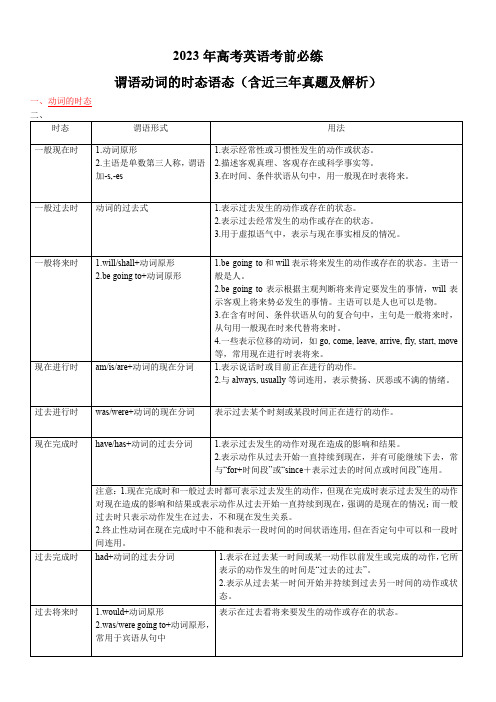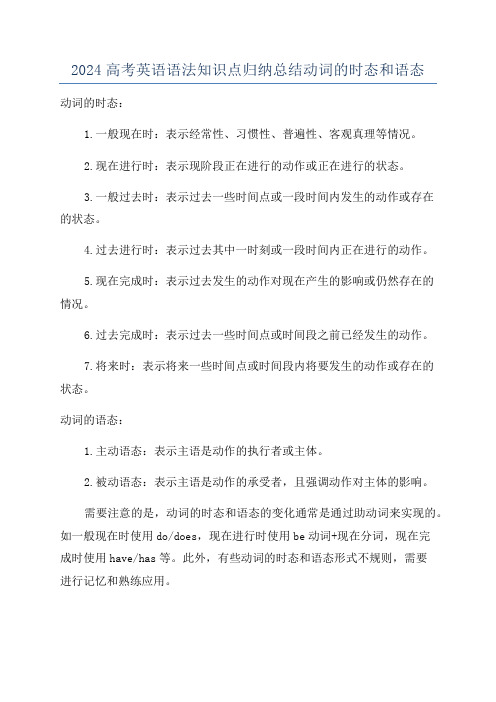高考英语动词时态知识点分类总结复习(含答案精品)
2023年高考英语考前必练 谓语动词的时态语态(含近三年真题及解析)

2023年高考英语考前必练谓语动词的时态语态(含近三年真题及解析)一、动词的时态特殊用法1.在时间、条件和让步状语从句中,如果主句谓语动词是一般将来时,从句用一般现在时。
如:We’ll have a picnic if it is fine next Sunday.如果下个星期日天气晴朗,我们将去野餐。
I’ll call you as soon as I get to Beijing tomorrow.我明天一到北京就给你打电话。
2.某些表示起始、往返、出发、到达之意的动词,可用一般现在时表示按规定、计划或安排将要发生的动作(此时一般都有一个表示未来时间的状语)。
这类动词有:begin, come, go, leave, start, arrive, end, stop, open, close等。
如:The meeting begins at 2:00 p.m. tomorrow.这个会议明天下午2点开始。
The next train leaves at 7 o’clock this evening.下一列火车将在今晚7点离开。
3.现在进行时与always, continually, forever等副词连用,表示反复出现或习惯性的动作,这种用法往往表达说话人的某种感情,如赞扬、遗憾、讨厌或不满等。
如:The rich woman is always laughing at the poor.这个有钱的夫人总是嘲笑穷人。
4.现在完成时中表示短暂动作的动词不能与for, since等引导的时间状语连用。
如与一段时间连用,要把瞬间动词转化为意思相近的延续性动词。
常见的变化有:特殊用法1.open,lock,write,read,sell,clean,wash,cut,drive等词作不及物动词时,它们的主语为物,可用主动语态表示被动意义。
如:This kind of pen writes very smoothly.这种钢笔写起来很流畅。
高中英语语法——动词的时态与语态word版 附答案

动词的时态与语态动词的分类:实义动词(及物动词、不及物动词)、连系动词、情态动词、助动词。
动词的时态、语态的重难点及高考考点:有八种时态在高考中经常考到1、一般现在时;2、一般过去时;3、一般将来时;4、现在进行时;5、过去进行时;6、现在完成时;7、过去完成时;8、过去将来时。
而其中最易混淆的三组时态是1、一般过去时和现在完成时;2、一般过去时和过去完成时;3、现在完成时和过去完成时动词语态:动词语态包括主动语态和被动语态,而被动语态是学习和备考的难点。
动词的时态:英语中的谓语动词要根据使用的时间不同而发生变化。
一般一个动词具有四种变化形式:一般现在时的单数三人称形式(用于一般现在时且主语是单数三人称时),动词的过去式(用于一般过去时),动词的现在分词(用于进行时),动词的过去分词(用于完成式和被动语态),各种词形变化都有相应规则,需熟记。
一般现在时:一、概念:经常发生的动作或习惯性的行为。
二、常连用的时间副词:always,every time, now and then,occasionally,often,seldom,sometimes, usually, frequently, once in a while.三、句型结构:(以动词work为例)主动结构:S+work/works+O; S+can/must+work+O; S+am/is/are+P.被动结构:S+am/is/are+worked(+by+O).四、常考的考点:(一)、在时间、条件、方式、让步状语从句中代替将来时态。
Eg:1.The water (pollute )unless some measures (take).2.Even if she (not come )this weekend, I (go) fishing by myself.3.He (visit) his aunt the day he (come) to Beijing.(二)、表示现在时刻存在的状态,这种状态带有一定的持续性。
2024高考英语语法知识点归纳总结动词的时态和语态

2024高考英语语法知识点归纳总结动词的时态和语态
动词的时态:
1.一般现在时:表示经常性、习惯性、普遍性、客观真理等情况。
2.现在进行时:表示现阶段正在进行的动作或正在进行的状态。
3.一般过去时:表示过去一些时间点或一段时间内发生的动作或存在
的状态。
4.过去进行时:表示过去其中一时刻或一段时间内正在进行的动作。
5.现在完成时:表示过去发生的动作对现在产生的影响或仍然存在的
情况。
6.过去完成时:表示过去一些时间点或时间段之前已经发生的动作。
7.将来时:表示将来一些时间点或时间段内将要发生的动作或存在的
状态。
动词的语态:
1.主动语态:表示主语是动作的执行者或主体。
2.被动语态:表示主语是动作的承受者,且强调动作对主体的影响。
需要注意的是,动词的时态和语态的变化通常是通过助动词来实现的。
如一般现在时使用do/does,现在进行时使用be动词+现在分词,现在完
成时使用have/has等。
此外,有些动词的时态和语态形式不规则,需要
进行记忆和熟练应用。
高考英语动词时态语态复习题附答案完整版.doc

(一)动词的时态时态动词是谓语动所表示的动作或情况发生时间的各种形式。
英语动词有16种时态,但是常用的只有9种:一般现在时、一般过去时、一般将来时、现在进行时、过去进行时、现在完成时、过去完成时、过去将来时、现在完成进行时。
下面分别介绍。
1、一般现在时的用法(do/does)1)表示经常性、习惯性的动作;表示现在的状态、特征和真理。
句中常用often, usually, every day, sometimes, every week/year, twice aweek 等时间状语。
例如:a. He goes to school every day.b. He is very happy.c.The earth moves around the sun.2) 在时间状语从句和条件状语从句中,用一般现在时表示将来。
例如:a. If you come this afternoon, we’ll have a meeting.b. When I graduate, I’ll go to countryside.3) 有时这个时态表示按计划、规定, 按时间表要发生的动作(句中都带有时间状语),但限于少数动词,如:begin, come, leave, go ,arrive, start , stop, return, open, close等。
例如:a.the meeting begins at seven.b.the rain starts at nine in the morning.4) 表示状态和感觉的动词(be, like, hate, think, remember, find, sound 等)常用一般现在进行时。
a.i like english very much.b.the story sound very interesting.5) 书报的标题、小说等情节介绍常用一般现在时。
2.一般过去时的用法(did)1)表示过去某时间发生的事、存在的状态或过反复发生的动作。
动词的时态和语态-2025年高考英语一轮复习参考答案

动词的时态和语态时态:时态主动被动一般现在时do/does; am/is/are am/is/are done一般过去时did; was/were was/were done 一般将来时will/shall do will/shall be done过去将来时would/should dowas/were going to dowas/were(about)to dowould/should be donewas/were going to be donewas/were(about)to be done现在进行时am/is/are doing am/is/are being done过去进行时was/were doing was/were be ing done将来进行时will/shall be doing现在完成时have/has done have/has been done过去完成时had done had been done将来完成时will have done will have been done2.必备知识考点一一般时知识点1一般现在时1.表示经常性的动作,常与usually,always,often,sometimes,never,every day等表示频度的时间状语连用。
2.表示客观真理、格言或者警句等。
3.表示按规定、时间表、计划或安排要发生的动作。
动词come, go, arrive, leave, start, begin, return, live, fly等,常用一般现在时表示将来发生的动作。
4.在时间、条件等状语从句中常用一般现在时代替一般将来时。
5.以here/there开头引导的倒装句,表示正在发生的动作/状态6.用于文章标题、图片说明、电影说明、戏剧内容及场景解说等。
知识点2一般过去时1. 表示在过去发生的一次性动作或习惯性动作或存在的状态,常用yesterday,last year,in 1995,the other day等作时间状语。
高考动词时态知识点归纳

高考动词时态知识点归纳在英语学习中,时态是一个非常重要的知识点。
当我们在应对高考英语试卷时,熟练掌握动词时态的使用就显得尤为重要了。
下面,我将对高考中常见的动词时态知识点进行归纳总结,帮助大家更好地掌握这一部分内容。
1. 一般现在时(Simple Present)一般现在时表示经常发生的动作、习惯、真理等。
它通常与时间状语词“usually”、“always”、“often”等连用。
例句1:I usually go to the park on Sundays.(通常我在星期天去公园。
)例句2:The Earth orbits around the Sun.(地球绕太阳转。
)2. 一般过去时(Simple Past)一般过去时表示过去发生的动作或状态。
它通常与表示过去的时间状语词“yesterday”、“last month”、“in 1999”等连用。
例句1:I watched a movie last night.(昨晚我看了一部电影。
)例句2:They lived in London three years ago.(三年前他们住在伦敦。
)3. 现在进行时(Present Continuous)现在进行时表示现在正在进行的动作,经常与“now”、“at the moment”等时间状语连用。
例句1:She is studying at the library now.(她正在图书馆学习。
)例句2:I am having dinner with my family at the moment.(我现在正在和家人吃晚饭。
)4. 过去进行时(Past Continuous)过去进行时表示过去某个时间点正在进行的动作,常与表示过去的时间状语连用。
例句1:He was playing basketball with his friends yesterday afternoon.(昨天下午他正在和朋友们打篮球。
高考英语二轮复习语法突破 专题八 动词的时态语态(含答案)
语法复习专题八动词的时态、语态I、时态重点难点解析高考中通常是把时态和语境结合起来考查。
题干中往往没有明确的时间状语,需要考生搜索出时间参照信息。
英语有16种时态,中学阶段常用的是10种。
一、动词的基本形式一览表1. 一般过去时和现在完成时1)一般过去时只表示过去发生的动作或状态,常和表过去的时间状语连用,即仅谈过去,不关现在。
I wrotea letter this morning. (只说明写了一封信的事实)2)现在完成时表示过去发生的动作或状态,但和现在有联系,可能刚结束,也可能继续下去。
不能和表过去的时间状语连用,译成汉语时可加“已经”。
I have written a letter this morning. (我已经写了一封信,有继续写第二封的可能,现在还是早上。
)2. 一般过去时和过去进行时1)一般过去时侧重于说明发生某动作的事实。
It rained heavily last night.昨晚雨下得很大。
(强调下雨,并不强调持续时间)2)过去进行时侧重于强调某动作的持续过程或表示动作在进行。
It was raining cats and dogs last night昨晚整整一夜都在下倾盆大雨。
(强调没停,一直持续)3. 现在完成时和现在完成进行时1) 现在完成时在含义上着重表示动作的结果。
I have read that book. (已读完)2)现在完成进行时着重表示动作一直在进行,即动作的延续性。
I have been reading that book all the morning.( 还没读完)注:It is/was +时间段since从句(从句的谓语动词如果是持续性动词:表示自从某人不做某事已多久了:It is/was +时间段since从句(从句的谓语动词如果是短暂性动词:表示自从某人做某事以来已多久了:Eg: It is ten years since he came here. 他来这儿已10年了。
高考英语动词时态和语态知识总结
高考英语动词时态和语态知识总结高考英语动词时态和语态知识总结如下:动词的时态和语态是历年高考英语测试的重中之重,一般占1—2道题。
命题思路有三:一是直接给出标志性时间状语,考生能依据所给时间状语作出选择;二是给出时间状语,但所给时间状语有着较强的干扰性,考生不能直接根据时间状语作出选择,需要结合语境判断;三是没有任何时间状语,需要借助于上下文语境,才能作出正确判断。
考生应熟知常用时态和被动语态的构成及用法。
高考题往往不会涉及单一的时态语态,而是更多地侧重于时态的交叉使用和呼应及与语态的结合使用。
所以解题时一定要结合语境,弄清时间的先后关系,可根据不同情况采取“找标法”(寻找时间标志词)、“呼应法”(主从句时态呼应)、“搭配法”(固定搭配)、“语境法”等解题技巧。
一识别标志词如果题干中有标志性的时间状语,则往往可以根据时间状语选择相应的时态[例]①More than a dozen students in that school ________ abroad to study medicine last year.A. sentB. were sentC. had sentD. had been sent[解析] 此题有明显的时间标志词last year,提示我们应该使用一般过去时;句中的主语students是被送的对象,应该使用被动语态答案为B动词的时态一般都有其相应的时间状语,请同学们熟记下列8种常用时态所对应的时间状语(1)一般现在时:often, always, usually, seldom, now, every day等(2)一般过去时:then, yesterday, last week, after that, ago, in the following/next few months等(3)现在进行时:now, right now, at present, at this moment, these days 等(4)过去进行时:then, at that time, at this time yesterday等(5)现在完成时: recently, lately, up to/till now, so far, in the past/last few months/years…, for+一段时间, since + 一点时间等(6)过去完成时:before, by the end of last month/years…等(7)一般将来时:tomorrow, today, next week/month…, in an hour, in the coming/following few weeks等(8)过去将来时:the following month, the next week等[命题角度及对策]高考测试动词时态须与句中时间状语一致时,常在题干中加入具体情景,以测试考生对动词时态知识的实际运用能力敏锐捕捉时间标志词,并结合具体的语境,选择出正确的动词时态,是解决此类问题的良策二主从时态须呼应如果所给题干是主从复合句,可根据主从句时态呼应的原则选出正确的时态命题角度及对策]近年来高考考查主从句的时态呼应时,常放在真实的并且符合实际的语境中进行考查在根据时态呼应原则解题时,要把握好以下几点:(1)在时间条件等状语从句中,用一般现在时表示一般将来时,一般过去时表示过去将来时,用现在完成时表示将来完成时(2)正确认定主句动词及从句动词两个动作发生的时间,并认真体会命题者所给出的语境(3)解答宾语从句与主句时态呼应题时,考生应熟知以下规则:主句动词为现在时,则从句动词可根据需要使用任何时态;主句动词为过去时,则从句动词须用恰当的过去的某种时态(表示客观真理时使用一般现在时)三仔细体会语境近年来高考试题对时态语态考查的要求越来越高,大部分试题趋向情境化实际化因此,仔细体会所给语境,根据具体语境选择合适的时态是考生需要重点解决的问题例:—Do you think we should accept that offer?—Yes,we should,for we______ such bad luck up till now,and time______ out.A. have had;is runningB. had;is runningC. have;has been runD. have had;has been run【答案解析】 A。
动词时态-备战高考英语复习语法知识点全面梳理(全国通用)
5. 表示心理和认知类动作的常见动词,常用一般现在时,如:like, love, hate,
dislike, want, need, hear, feel, see等。
e.g. The cup feels hot.
4.2 一般过去时
1. 表示过去某个时间里发生的动作或状态. e.g. Bob came across an old friend in the street the other day.
8. I have been waiting for the bus since 9 o’clock.. 现在完成进行时
9. I had waited for the bus before I took a taxi. 过去完成时
10. I had been waiting for the bus for an hour when it finally arrived.. 过去完成进行时
进行
▲现在进行时 am/is/are doing
▲过去进行时 was/were doing
▲将来进行时 will be doing
过去将来进行时 would be doing
完成
▲现在完成时 have/has done
▲过去完成时 had done
▲将来完成时 will have done
过去将来完成时 would have done
新高考全国卷I
谓语动词
China has become the first country to land a spacecraft on the far side of the moon. The unmanned Chang’e-4
probe
(探测器)
2019年高考英语真题分类汇编:专题05-动词的时态和语态(含答案解析)
专题五动词的时态和语态1.【2018·北京】22.--Did you enjoy the party?--Yes,we___by our hosts.A.were treatedB.would be treated.C.treatedD.had treated【答案】A【解析】试题分析:句意:——你喜欢这个聚会吗?——是的,我们的主人很好的招待了我们。
根据上一句中的did可知用一般过去时;且we和treated是动宾关系,用被动语态。
空中应用一般过去时的被动语态,故选A。
【考点定位】考查动词的时态及语态。
【名师点睛】本题考查时态和语态,本题需要先看句子中有没有明确的时间状语,然后再看有没有相关的词,比如隐藏的时间点,和一些动词的过去式。
解答时态语态题时,学生需要注意结合上下文语境,找出相关提示词来判断时态;并且分析出主语和动词是主谓关系还是动宾关系。
2.【2018·北京】26.in the last few years,China ___ great achievements in environmental protection.A.has madeB.had madeC.was makingD.is making【答案】A【解析】试题分析:句意:在过去的这些年里,中国在环境保护中取得了很大的成就。
由时间状语in the last few years 可推知动作从过去一段时间持续到现在并对现在造成影响,用现在完成时。
故选A。
【考点定位】考查时态。
【名师点睛】判断时态可以从时间状语入手,题干中的in the last few years为现在完成时的时间标志词。
类似的还有over/ for/ during the last/ past years/months…均为现在完成时的时间标志,所以做此类题时,需要先看句子中是否有明确的时间点,然后我再判断时态。
3.【2018·北京】27.—Did you have difficulty finding Ann' house?—Not really.She___us clear directions and we were able to find it.easily?A.was to giveB.had givenC.was givingD.would give【答案】B【考点定位】考查时态。
- 1、下载文档前请自行甄别文档内容的完整性,平台不提供额外的编辑、内容补充、找答案等附加服务。
- 2、"仅部分预览"的文档,不可在线预览部分如存在完整性等问题,可反馈申请退款(可完整预览的文档不适用该条件!)。
- 3、如文档侵犯您的权益,请联系客服反馈,我们会尽快为您处理(人工客服工作时间:9:00-18:30)。
高考英语动词时态知识点分类总结复习(含答案精品)【专题考案】1. We _____ with you for the time being.A. will stayB. will be stayingC. would stayD. have stayed2. —Who sings best in your class?—Mary _____.A. isB. doesC. doD. sing3. She _____ her pen in her room now.A. findsB. is findingC. looks forD. is looking for4. What _____ you _____ tomorrow morning?A. are/going to doB. are/doingC. are/doneD. have/done5. It was not long before the water _____ cold.A. is feelingB. feelsC. feltD. was feeling6. I _____ as soon as you come back.A. wentB. have goneC. am goingD. shall go7. The scientist _____ Canada and he will give us a talk when he _____ back.A. has gone to/comesB. has been to/will comeC. has gone to/will comeD. has been to/comes8. He found his book this morning, but now he _____ his pen.A. losesB. is missingC. has lostD. lost9. She ___¬_ to her hometown several times.A. has beenB. has goneC. wentD. is going10. It _____ Jane and Mary who helped me the other day.A. isB. wasC. areD. were11. I _____ to bed when the telephone rang.A. have beenB. wentC. am goingD. was going12. Jane _____ some washing this time yesterday.A. is doingB. had doneC. was doingD. did13. When I got to the school, the first class _____.A. had begunB. beganC. is beginningD. has begun14. Mother promised she _____ me an English-Chinese dictionary.A. is buyingB. will buyC. would buyD. has bought15. She objects to _____ loud music _____ while she reads newspapers.A. have/playB. have/playedC. having/playingD. have/playing16. If it _____, we will go to visit the zoo.A. not rainsB. doesn’t rainC. won’t rainD. isn’t going to rain17. Our English teacher _____ all the exercise books last Friday evening.A. has correctedB. will correctC. had correctedD. corrected18. —What are you doing under the table?—I _____ to find my watch.A. triedB. tryC. am tryingD. have tried19. There _____ an English evening party next Saturday.A. is going to beB. will haveC. is to haveD. is going to have20. It is getting late. It’s time we _____.A. goB. wentC. are goingD. must go21. Continue heating until steam _____.A. has appearedB. appearC. appearedD. will appear22. Don’t get that ink on the shirt, for it _____.A. doesn’t wash outB. won’t be washing outC. isn’t washing outD. won’t wash out23. I haven’t seen her _____.A. two weeks agoB. since two weeksC. for two weeksD. before two weeks24. My brother _____ the Youth League since 1990.A. joinedB. has been inC. has joinedD. had joined25. —Where is Peter? —He _____ to Shanghai.A. wentB. had goneC. has beenD. has gone26. I knew I could not finish the homework _____.C. until he has comeD. when he comes27. He _____ English for ten years by the time he takes the examination.A. will have been studyingB. would have been studyingC. will studyD. studied28. The bus came after I _____ for about half an hour.A. had been waitingB. have been waitingC. have waitedD. was waiting29. I saw that he _____ at seven o’clock last night.A. still workedB. is still workingC. was still workingD. had been working30. I didn’t go to see the film because I _____ it.A. sawB. have seenC. had seenD. am seeing31. Did you ask the teacher what _____ this afternoon?A. will we doB. we would doC. shall we doD. would we do32. Who _____ to school earliest in your class every morning?A. comesB. comeC. will comeD. is coming33. I’m sure I _____ her four years ago.A. have seenB. sawC. had seenD. will see34. An unexpected heavy rain caused severe flooding, and the water _____ all the time.A. roseB. raisedC. was risingD. was raising35. _____ a noise just then?A. Have you heardB. Were you hearingC. Are you hearingD. Did you hear36. Great changes _____ in the last twenty years in China.A. took placeB. have taken placeC. were taking placeD. have been taken place37. _____ that dress when he first saw you in the street?A. Are you wearingB. Did you wearC. Have you wornD. Were you wearingA. is always workingB. was always workingC. always workedD. has always worked39. I will ask her for the book now, for she ____ plenty of time to read sinceI lent it to her.A. hasB. has hadC. had hadD. was having40. Our football team _____ every match so far this year, but we still have three more games to play.A. winsB. was winningC. had wonD. has won41. I don’t think Jim saw me; he _____ into space.A. just staredB. has just staredC. was just staringD. is just staring42. —_____ my glasses?—Yes, I saw them on your desk a minute ago.A. Do you seeB. Have you seenC. Had you seenD. Would you see43. —Who is Clarke?—_____ him yet? I saw you shaking hands with him at the meeting.A. Haven’t you metB. Hadn’t you metC. Didn’t you meetD. Don’t you meet44. —I’m sorry to keep you waiting.—Oh, not at all. I _____ here only a few minutes.A. amB. wasC. have beenD. will be45. I don’t work here; I _____ until a new secretary arrives.A. am just helping outB. just help outC. have just helped outD. will just help out46. I first met Lisa three years ago. She _____ at a radio shop at that time.A. has workedB. was workingC. had been workingD. had worked47. Lily _____ a book a bout China last month but I don’t know whether she has finished it.A. wroteB. had writtenC. is writingD. was writing48. —Is this raincoat yours?—No, mine _____ there behind the door.49. —Lucy is not coming tonight.—But she ___!A. had promisedB. will promiseC. promisedD. promises50. —Your phone number again? I _____ quite catch it.—It’s 89703388.A. don’tB. can’tC. couldn’tD. didn’t51. I can guess you were in a hurry. You _____ your sweater inside out.A. had wornB. woreC. were wearingD. are wearing52. — We _____ that you would fix the TV set this week.—I’m sorry. I __ t o, but I’ve been too busy.A. had expected; had intendedB. are expecting; had intendedC. expect; intendD. expected; intend53. He will stop showing off, if no notice _____ of him.A. is takenB. will be takenC. takesD. has taken54. — It is said that another new car factory _____ now.— Yeah. It _____ one and a half years.A. is building; takesB. is being built; will takeC. is built; will takeD. is being built; takes—You _____ your temper but that’s OK.A. have lostB. had lostC. did loseD. were losing56. — Why? Tom, your shirt is so dirty!— Mum, I _____ my storeroom downstairs。
